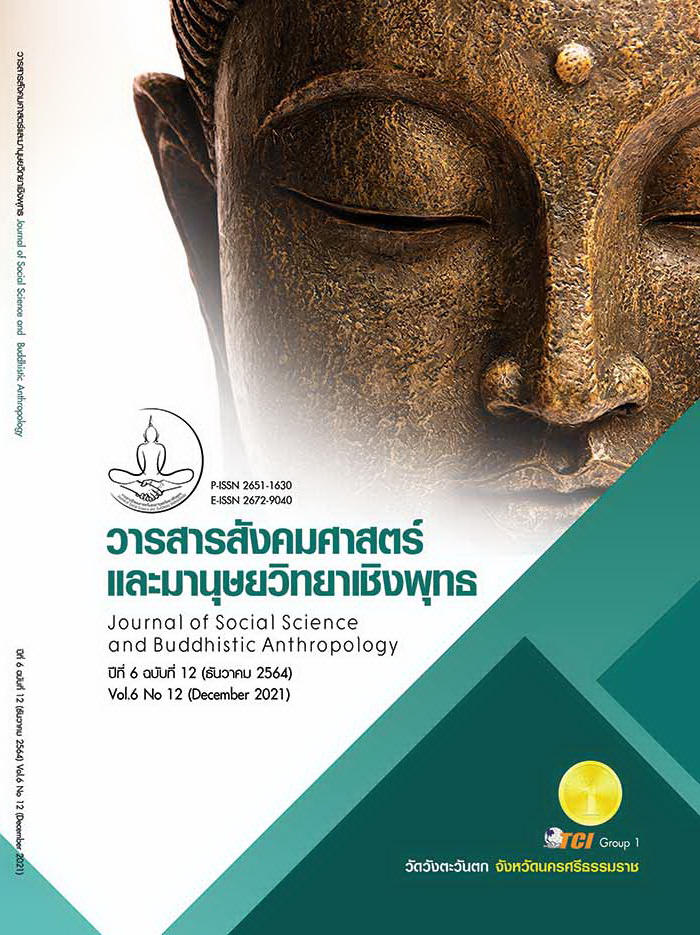PROBLEMS OF PROTECTION OF THE CONVICTS SENTENCED TO DEATH IN THE KINGDOM OF THAILAND: A CASE STUDY ON THE INDIVIDUAL REQUEST OF A ROYAL PARDON
Keywords:
โทษประหารชีวิต, การอภัยโทษ, ผู้ต้องคำพิพากษาประหารชีวิตคดีถึงที่สุดหรือนักโทษประหารAbstract
The objectives of this research article were to study 1) the theory concepts of protection of the convicts sentenced to death in the final case by requesting the royal pardon due to the strict law enforcement and deficiencies in litigation of the organizations in the judicial process, 2) the problems of knowledge, understandability, and access to the principles, methods, and the forms of the petitions asking for the royal pardon of the convicts sentenced to death, 3) the lack of organizational involvement in the judicial process in determining the principles, methods, and the forms of the petitions, public relations, and introduction for the petition writing, and 4) to take the legal measures from the research to improve and amend the Thai pardon law to meet standardization. The research is a qualitative research by studying the documents and from an in-depth interview with a population of 29 people and presenting the study results in description. The research results showed that 1) all the death row convicts offered their royal pardon petitions due to the law to inform the right to such people in order to relax the strict law enforcement and deficiencies of the organizations in the judicial process because the results of the adjudication of the pardon petitions were release, reduce of penalty or abrogate the pardon petitions, for reasons of not knowing the principles and the incorrect writing of the pardon petitions. 2) The principles, methods, and the forms of the petitions had been established by Department of Corrections. There was no publicity for other organizations to know and they were not published in the Government Gazette. The death row convicts and general public were not known the mentioned measures. 3) The organizations in the judicial process were not involved in setting the principles, methods, and the forms of the petitions whereas there was no main organization to do so. 4) The legal measures derived from the research must be led to amendments of the Thai pardon law by defining the forms of the petitions and the components clearly
References
กรมราชทัณฑ์. (2561). ย้อนรอยคดีชิงทรัพย์นักโทษประหารรายล่าสุด. เรียกใช้เมื่อ 15 กุมภาพันธ์ 2564 จาก http://www.correct.go.th
. (2563). สถิตินักโทษประหารชีวิตประจำเดือนธันวาคม 2563. เรียกใช้เมื่อ 23 พฤศจิกายน 2564 จาก http://www.correct.go.th
กิตติพงษ์ ศุภพงศ์กร. (2551). การยกเลิกโทษประหารชีวิต. ใน วิทยานิพนธ์นิติศาสตรมหาบัณฑิต สาขาวิชานิติศาสตร์. มหาวิทยาลัยธุรกิจบัณฑิตย์.
จรัญ โฆษณานันท์. (2545). สิทธิมนุษยชนไร้พรหมแดน ปรัชญา กฎหมาย และความเป็นจริงทางสังคม. กรุงเทพมหานคร: นิติธรรม.
ชฎารัตน์ ทองรุต. (2556). ความชอบธรรมของอำนาจในการอภัยโทษ. ใน วิทยานิพนธ์นิติศาสตรมหาบัณฑิต สาขาวิชานิติศาสตร์. จุฬาลงกรณ์มหาวิทยาลัย.
ชัชพล ไชยพร. (2550). แนวคิดเรื่องการให้อภัยโทษในสังคมตะวันตกยุคก่อนคริสต์ศตวรรษที่ 18. วารสารกฎหมาย, 25(ฉบับพิเศษ), 455-460.
ประมวลกฎหมายวิธีพิจารณาความอาญา. (2478). ราชกิจจานุเบกษา เล่ม 52 หน้า 598 (10 มิถุนายน 2478).
ประมวลกฎหมายอาญา. (2499). ราชกิจจานุเบกษา เล่ม 73 ตอนที่ 95 หน้า 1 (ฉบับพิเศษ) (15 พฤศจิกายน 2499).
ราชบัณฑิตยสถาน. (2542). พจนานุกรมฉบับราชบัณฑิตยสถาน พ.ศ. 2542 (พิมพ์ครั้งที่ 1). กรุงเทพมหานคร: นานมีบุ๊ค.
ศิริ ปะทะขีนัง. (2550). การอภัยโทษ : ศึกษาปัญหาทางกฎหมายในการอภัยโทษ. ใน นิติศาสตรมหาบัณฑิต สาขาวิชานิติศาสตร์บัณฑิตวิทยาลัย. มหาวิทยาลัยธุรกิจบัณฑิตย์.
สมบูรณ์ เตชะวงศ์. (2555). พระราชทานอภัยโทษ. กรุงเทพมหานคร: อนิเมทกรู๊ป.
Downloads
Published
How to Cite
Issue
Section
License
Copyright (c) 2021 Journal of Social Science and Buddhistic Anthropology

This work is licensed under a Creative Commons Attribution-NonCommercial-NoDerivatives 4.0 International License.









